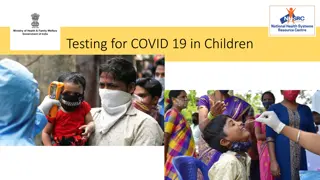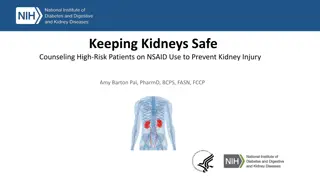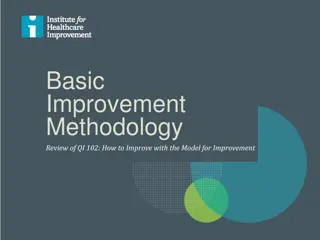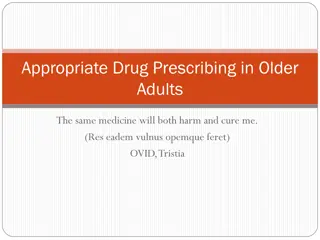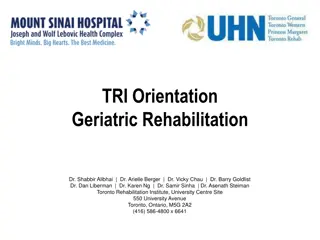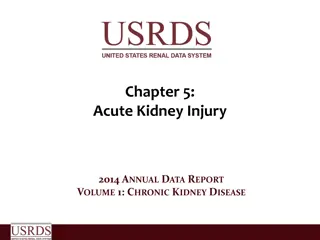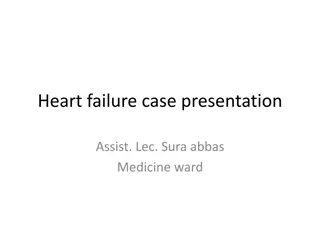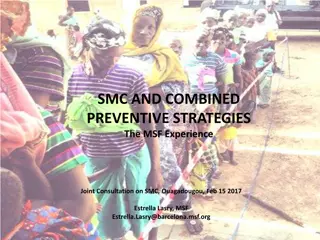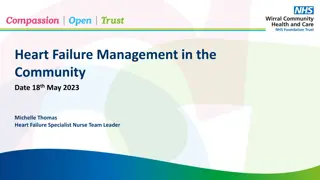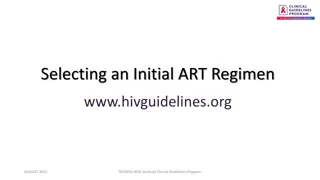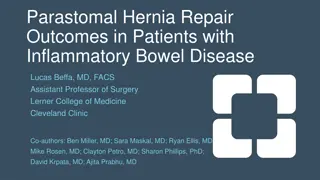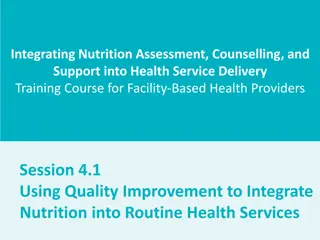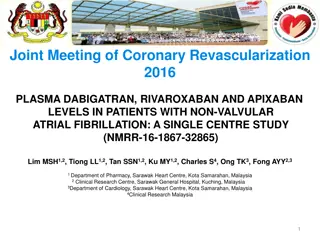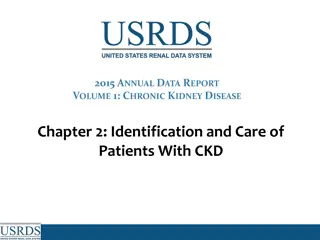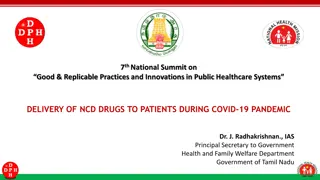Strategies to Reduce Pressure Ulcers in Hospital Patients
Hospital-acquired pressure ulcers (HAPUs) are a significant issue affecting patient outcomes and healthcare costs. Factors contributing to HAPUs include immobility, comorbidities, and older age. Implementing patient-centered care, evidence-based practices, and quality improvement strategies, as outl
0 views • 18 slides
Understanding Spondylodiscitis: Diagnosis, Treatment, and Prognosis
Spondylodiscitis is an infectious inflammation affecting the spine's discs and adjacent vertebrae, posing challenges due to potential complications like abscess formation. Early diagnosis and prompt treatment are crucial for a favorable outcome, focusing on infection eradication, pain management, de
0 views • 22 slides
Multidisciplinary Approach to Bariatric Surgery: Case Study and Interventions
This case study involves a patient with severe obesity and comorbidities preparing for bariatric surgery. The medical history includes type 2 diabetes and significant obstructive sleep apnea, leading to a reduced quality of life. The patient's psychosocial assessment highlights the importance of psy
4 views • 7 slides
Understanding the 3 Ts of Trauma: Trajectory, Treatment, and Trust
This comprehensive guide delves into the critical aspects of trauma - Trajectory, Treatment, and Trust. It covers the definition of trauma, PTSD symptoms, potentially traumatic events, trajectories of traumatic stress, and the impact of trauma on mental health. Explore the effects on behavior, biolo
0 views • 29 slides
Guidelines for COVID-19 Testing in Children
Information on testing for COVID-19 in children, including symptoms to watch out for, when to suspect COVID-19 in a child, when to get a child tested, and recommendations for testing in cases of comorbidities. Details on recommended tests, including Rapid Antigen Test and RT-PCR, along with the impo
1 views • 13 slides
Preventing Kidney Injury: Counseling High-Risk Patients on NSAID Use
Understand the impact of drugs on kidney function, identify patients at risk for acute kidney injury (AKI), and learn key opportunities for pharmacists to educate and prevent NSAID-induced AKI. AKI is common and preventable, particularly among elderly patients and those with diabetes, hypertension,
0 views • 29 slides
Improving Quality with the Model for Improvement
In this content, we delve into the Model for Improvement methodology, focusing on key aspects such as setting aims, choosing measures, developing and testing changes. It discusses the three questions in the Model, elements of an effective aim statement, types of measures, and utilizing change concep
1 views • 27 slides
Collaborative Approach in Psycho-Oncology and Palliative Care
This educational curriculum emphasizes the importance of addressing psychiatric comorbidities in palliative care and psycho-oncology patients. It covers diagnostic challenges, evidence-based treatments, and screening for substance use disorders. The content also discusses the principles of palliativ
0 views • 53 slides
Epidemiology and Comorbidity at MRH Mthatha Regional Hospital by Dr. R. Kaswa
This presentation by Dr. R. Kaswa from the Department of Family Medicine and Rural Health at MRH Mthatha Regional Hospital covers the epidemiology, screening, testing, recoveries, mortality, and lessons learned from the COVID-19 pandemic. It provides statistics on COVID-19 cases, testing positivity
0 views • 24 slides
Understanding Co-morbidities in People Living with HIV
Exploring the various co-morbidities associated with HIV infection and factors contributing to their development. Discussions on disease clusters, impact of risk factors such as smoking and cardiovascular disease, and comorbidities in parents of PLWH compared to HIV-negative individuals. Insights in
0 views • 14 slides
Strategies for Managing Psychological Claims in the Workplace
Explore effective tools and techniques for managing trauma-related psychological claims in the workplace. Learn about common psychological diagnoses, comorbidities, and strategies for communication and intervention. Discover the importance of work-life balance and enhancing recovery outcomes for emp
0 views • 46 slides
Appropriate Drug Prescribing in Older Adults: Balancing Harm and Cure
Understanding age-related changes in pharmacokinetics and pharmacodynamics is crucial for appropriate drug prescribing in older adults. Recognizing high-risk medications to avoid, understanding common drug interactions, and conducting regular drug list reviews are key components in providing safe an
1 views • 47 slides
Understanding Geriatric Rehabilitation and Disability Models
Acute medical illnesses can lead to functional decline in elderly individuals, requiring comprehensive geriatric assessments and rehabilitation. This involves addressing factors like frailty, comorbidities, and social/environmental barriers. Disability is viewed through both medical and social model
0 views • 34 slides
Comparative Study on Health Effectiveness in Chronic Kidney Disease
Study focuses on the benefits of adding cardiac catheterization and revascularization to medical therapy in stable CKD patients with moderate ischemia. The ISCHEMIA-CKD trial compared invasive versus conservative treatment strategies, enrolling high-risk patients with various comorbidities. Results
2 views • 21 slides
Strategies for Addressing Childhood Obesity in Canadian Children
This content delves into the prevalence of overweight and obesity in Canadian children, comorbidities associated with these conditions, impacts in adulthood, and challenges in adherence to care standards. It also discusses practical intervention guidelines focused on lifestyle modifications and moti
0 views • 34 slides
Partnering to Improve Tobacco Cessation Coverage in X State
This presentation focuses on addressing the issue of tobacco use and the gaps in cessation treatment for State employees. It discusses the costs of tobacco use, the benefits of tobacco cessation coverage, and the ACA requirements for insurers. It also explores opportunities for collaboration to expa
0 views • 29 slides
Understanding Sleep Disorders in Children and Adolescents
This informative presentation by Dr. Rebecca Cho delves into the complexities of sleep architecture and physiology across different life stages. It explores various pediatric sleep disorders, their comorbidities, and the potential developmental consequences of sleep disruption. The discussion also c
0 views • 49 slides
Understanding B-Cell Prolymphocytic Leukaemia and CLL-Related Conditions
B-cell prolymphocytic leukaemia (B-PLL) is a rare disorder that mainly affects older patients, presenting with splenomegaly and high white blood cell counts. CLL-related conditions like Monoclonal B-cell lymphocytosis and Richter's syndrome can further complicate the prognosis, especially in elderly
0 views • 23 slides
Complex Case Study: CABG Surgery with Complications and Challenges
A 35-year-old male autodriver presented with dyspnea, chest pain, and a history of alcohol addiction. Past procedures included PTCA with stent in the LAD. Diagnostic tests revealed severe cardiac issues leading to CABG surgery with a twist involving pericardial adhesiolysis and cardiopulmonary bypas
0 views • 19 slides
Behavioral Health Readmissions in Massachusetts Acute Care Hospitals Overview
This presentation delves into the prevalence of behavioral health comorbidities and readmissions in Massachusetts acute care hospitals. It highlights the importance of addressing behavioral health conditions in hospital settings, emphasizing the need for improved discharge planning and quality impro
0 views • 30 slides
Trends in Acute Kidney Injury Among Medicare Patients Aged 66 and Older
This report analyzes data from the 2014 Annual Data Report Volume 1 on Chronic Kidney Disease, focusing on acute kidney injury (AKI) among Medicare patients aged 66 and older from 2003 to 2012. It examines the percentage of patients with AKI hospitalizations and those requiring dialysis, along with
0 views • 20 slides
Understanding Late-Life Depression: Causes, Prevalence, and Diagnosis
Late-life depression is a prevalent condition among older adults, with factors such as personal history, medical comorbidities, and lack of social support contributing to its onset. This article discusses mood disorders, prevalence rates, risk factors, and differential diagnosis for depressed mood i
0 views • 13 slides
Comprehensive Evaluation of Heart Failure in a 68-Year-Old Man with Co-Morbidities
A 68-year-old man with a history of CAD, type 2 diabetes, and other comorbidities presents with symptoms suggestive of heart failure. His chief complaints include dyspnea, orthopnea, lower extremity edema, and decreased exercise tolerance. Through medical history, physical examination, and diagnosti
0 views • 12 slides
Respiratory Care in FSHD: Guidelines and Management Overview
Comprehensive overview of respiratory care in Facioscapulohumeral Muscular Dystrophy (FSHD) based on the American Academy of Neurology guidelines. Covers incidence of respiratory insufficiency, assessment of lung function, treatment options including noninvasive ventilation, and strategies for maint
0 views • 16 slides
Understanding Plantar Fasciopathy: Causes, Symptoms, and Management
Plantar Fasciopathy, also known as Plantar Heel Pain, is characterized by inflammatory or degenerative changes in the plantar fascia leading to heel pain. Causes include weight-bearing activities, tight calf muscles, obesity, foot mechanics, and comorbidities like diabetes. Symptoms involve heel and
0 views • 13 slides
Benefits of Bariatric Surgery for Obesity Patients
Bariatric surgery is a highly effective treatment for obesity, offering significant improvements in comorbidities such as diabetes, hyperlipidemia, and hypertension. Studies show that the surgery resolves conditions like obstructive sleep apnea and gastroesophageal reflux, leading to improved qualit
0 views • 52 slides
Kentucky Department of Education School Improvement Efforts
The Kentucky Department of Education focuses on school improvement efforts through Comprehensive Support and Improvement (CSI), Targeted Support and Improvement (TSI), and Additional Targeted Support and Improvement (ATSI) programs. Schools undergo a statutory and regulatory process as per state law
0 views • 7 slides
Combined Preventive Strategies in Public Health Interventions
MSF's experience in implementing combined preventive strategies focusing on SMC, Vaccination, and Nutrition Screening in various countries like Mali, Niger, Chad, and Nigeria. The interventions aim to address malnutrition, improve vaccination coverage, and reinforce EPI programs. Advantages include
0 views • 7 slides
Comprehensive Approach to Heart Failure Management in the Community
This detailed guide covers the signs of decompensation in heart failure patients, actions to take in primary care including diagnostic tests like echocardiograms, and treatment strategies for fluid overload, blood pressure control, heart rate management, and comorbidities like COPD and renal issues.
0 views • 6 slides
Vascular Cases and Interventions Overview
Joseph M. Griffin, MD, RVT, a clinical instructor and assistant professor in surgery, presents cases involving vascular lesions, patient characteristics, and treatment approaches. Cases include individuals with peripheral artery occlusions, comorbidities such as hypertension and diabetes, and unsucc
0 views • 23 slides
Understanding Depression in Older Adults: Symptoms, Risk Factors, and Treatment Options
Depressive symptoms in older adults are common but often go unrecognized. While depression is not a normal part of aging, older adults may exhibit a variety of depressive symptoms. Risk factors include pain, isolation, insomnia, medical comorbidities, and more. Classification includes Major Depressi
0 views • 38 slides
Selecting an Initial ART Regimen Guidelines
Guidelines for selecting an initial antiretroviral therapy (ART) regimen include performing genotypic HIV resistance testing, engaging in shared decision-making with patients, considering comorbidities and coadministered medications, and prescribing preferred regimens. Recommendations also include c
0 views • 32 slides
Outcomes of Parastomal Hernia Repair in Inflammatory Bowel Disease Patients
This study examines the outcomes of parastomal hernia repair in patients with inflammatory bowel disease, specifically comparing outcomes between those with Crohn's disease and ulcerative colitis. The research, conducted from 2012 to 2022, analyzes data from 392 patients, highlighting factors such a
0 views • 16 slides
Overview of Belgian Cancer Registry and Research Initiatives
Belgium's national cancer registry, established in 2004, covers a population of 11 million with data available since 2004. The registry includes specific legislation and authorization for data use, ensuring quality data collection and longitudinal follow-up. Various data sources feed into the regist
1 views • 13 slides
Integrating Nutrition Assessment and Counseling: Quality Improvement in Health Services
This training course focuses on integrating nutrition assessment, counseling, and support into routine health services using quality improvement methods. Participants will learn to explain the concept of quality improvement, develop a plan for integrating nutrition services, and understand key princ
0 views • 32 slides
Collaborative Approach to Treating Anxiety: Comprehensive Care Strategies
Collaborative care in treating anxiety involves a thorough assessment, differential diagnosis, treatment planning, and client education. Providers should be empathetic, challenge stigma, and consider comorbidities. Interactions with clients should acknowledge individual interpretations of symptoms a
0 views • 8 slides
Plasma Levels of NOACs in Patients with NVAF: Single Centre Study
This study aims to characterize the plasma levels of Dabigatran, Rivaroxaban, and Apixaban in patients with non-valvular atrial fibrillation (NVAF) who have been taking these drugs for more than 4 days. The research also assesses median trough plasma levels of these anticoagulants, as well as their
0 views • 18 slides
Understanding Disease-Space: Implications for Predictive Medicine
Disease-Space (DS) refers to the distribution of combinations of comorbidities at a population level. By studying DS, we can enhance predictive analytics in clinical trials, decision support algorithms, and quality measurement. Projects focusing on DS shape and similarities in twin studies offer ins
0 views • 24 slides
Chronic Kidney Disease: Prevalence and Comorbid Conditions Among Medicare Patients
The data report presents information on the identification, care, and prevalence of Chronic Kidney Disease (CKD) among Medicare patients aged 65 and above in 2013. It includes tables showing the ICD-9-CM codes for CKD stages, prevalence of coded comorbid conditions (CKD, CVD, DM), demographic charac
0 views • 15 slides
Innovative Approach to Delivering NCD Drugs During COVID-19 Pandemic in Tamil Nadu
Covid-19 posed challenges to delivering NCD drugs, especially to those with comorbidities. Tamil Nadu implemented proactive measures such as cocooning the vulnerable and providing two months' worth of NCD drugs to ensure uninterrupted supply. Various committees and volunteers collaborated to educate
1 views • 17 slides




